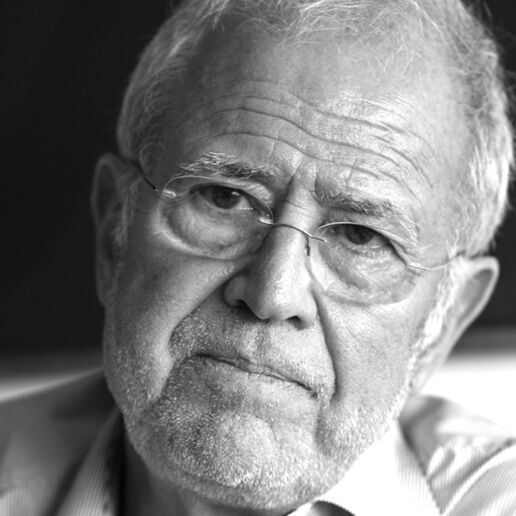AARON NOMMAZ
When you move past Kabataş is ‘Setüstü’ neighborhood, on the range of new generation local cafes … Floor is İstanbul, and the apartment Portugal Consulate. Behind the table overlooking the Bosphorus’ pure beauty with the smell of the sea, is a ‘secret’ Istanbul hero who speaks with a warm smile beneath his reading glasses: Aaron Nommaz.
Today, the fact that he has a separate office as a private counselor in the Istanbul Consulate of Portugal which he referred to as his ‘grandfather’s country’ is only one part of his identity. Similarly is the fact that he wrote historically and culturally precious books about Jewish mark in Ottoman History even though he is not a writer (‘Yahudi Casus: Josef Nasi (The Jewish Spy: Josef Nasi)’ and ‘‘Kanuni’nin Yahudi Bankeri: Dona Gracia (The Jewish Banker of ‘Kanuni’: Dona Gracia))… Diplomat, engineer, entrepreneur, a child raised in ‘Büyükada’ and above all, an Istanbul lover.
He has profound references for his writings. He has knocked the door of many ‘great’ historians including İlber Ortaylı, made long conversations with them about the place of Jewish people in Ottoman history, and every time he asked them “I wish you publish a book about these issues”, he received the same answer: “You would be the best person to write it dear Aaron. You sit down and write; you have my support.”
SMELLS LIKE A ROSE GARDEN
He is originally from İzmir. His relationship with İstanbul which he moved when he was 9 years old is as strong as to make him say:
“No generation ever had fun as much as we did at Büyükada …” His childhood and high school years were spent in Nişantaşı; he excitedly remembers how he used to go home from school using the trolley. And ofcourse the 17.15 Büyükada Ferry: “It is the time when everyone leaves work and make their way back to Büyükada. Especially if my father had an important guest, I definitely was sent to the ferry earlier so that I can find empty seats. Those ferry rides were details with a lot to say to the spirit of those times of which everyone on it was very well-dressed and had conversations with each other …” We remember the balls where all Turkish, Jewish and Greek friends joined together; with a slightly nostalgic tune in his voice, he says: “My son has not even dreamt of them, let alone seeing them in real life.”
“Here is my country, my city,” he continues his story; he describes the color that a population seen as a ‘minority’ in all Turkey but especially in Istanbul creates, using an İnönü-Atarük anecdote: “İnönü got tired of the conflicts and the disagreements between different groups and he went to Atatürk and snapped saying ‘Let’s throw all these people out of the county ’. At that moment Atatürk, who was taking care of the flowers in the garden, told İnönü that he had a headache and asked him to come back again the next day. The next day x-comes and İnönü finds Atatürk again in the garden. ‘Sir, yesterday we had wonderful and colorful roses. What happened to all of them?’ The answer comes quick: ‘I removed them all. And I planted only tulips instead. What do you think?’“
A ‘CULTURAL’ WONDERLAND: ISTANBUL
Although he talks about lines that ‘are not visible but felt deeply’, to Nommaz, this is a kind of red line that has no correspondence among the people of Istanbul, within neighborhoods, on the streets, on the tables and only represented by the government. ‘Hodja’ jokes, food rituals, daily expressions… According to Nommaz all of them are so close, in fact so similar, that it is hard to distinguish which one has influenced the other: “We used to leave the house door open during the holidays. Our Muslim neighbors used to come by and joined our holiday rituals. While they curiously inspected our traditions, they also enjoyed celebrating the holidays with us. We used to like opening the refrigerators of each other’s houses without reserve and discover a different delight.”
The pains of living in a metropole, government policies, the naivety and the natural relationships that got lost over time… Hundreds of ‘cultural’ anecdotes that decay, extinguish, and disappear from the rich culture of the city and from the collective memory… Even though it looks like irreversible erosion, despite everything, is it possible to preserve this cultural wealth by individually holding on to it? “Of course… The greatest privilege of living in İstanbul was the chance to discover different cultures and experience them without leaving where you are” says Nommaz. And quickly he adds: “This is a city which has so deep layers and is so multicultural that spending an ordinary day here is worth a huge ‘cultural travel’. This is İstanbul. No matter how hard they try, they cannot manage to erase some stories and some qualities from your soul.”
CITY THAT NEVER GETS OLD
At the meantime we are watching İstanbul which he describes as “the city like a school for life”. The ferry comes into the port, the traffic gets slower, the seagulls enthuse… Here’s Nommaz’ thesis: A person who graduates from this city by experiencing İstanbul with all the cultures and all the colors it contains, can deal with anything. The reason for that is simple and intelligible: “People grow up here as more understanding and more open to interaction. Their perspective and perception get richer. This is an interesting place so that even if you live 100 years on it you can learn something new from a different corner. You only need to know how to look and how to live…”


